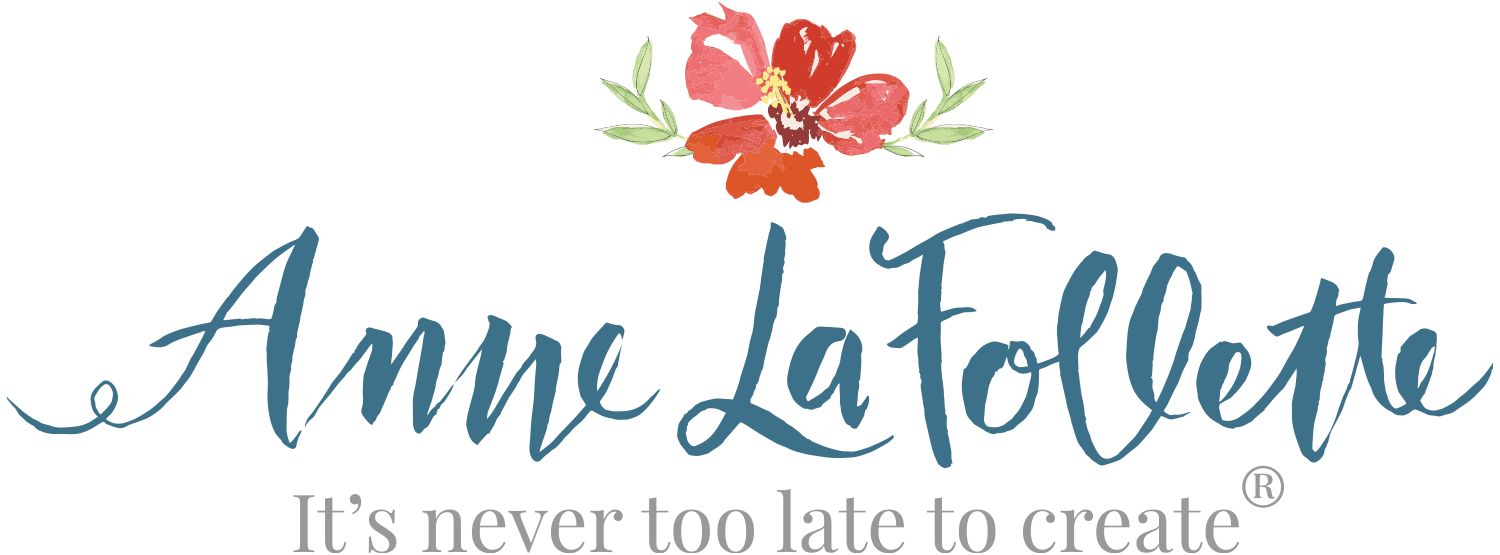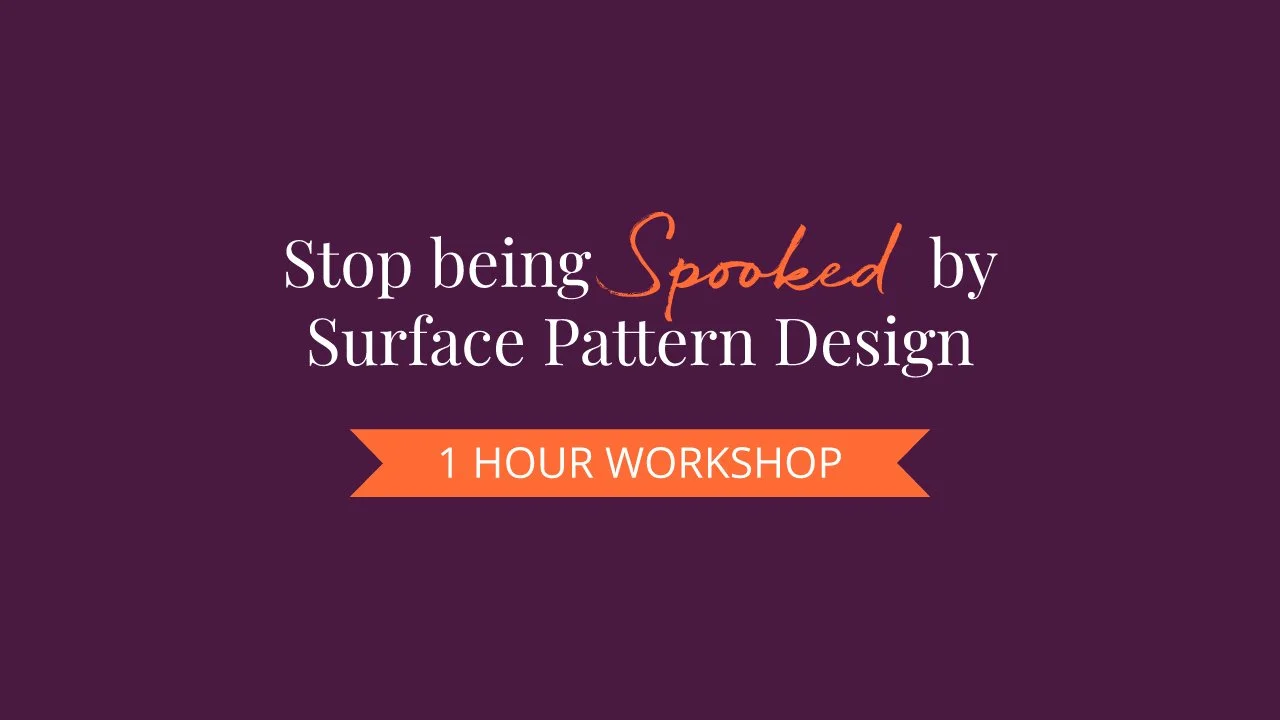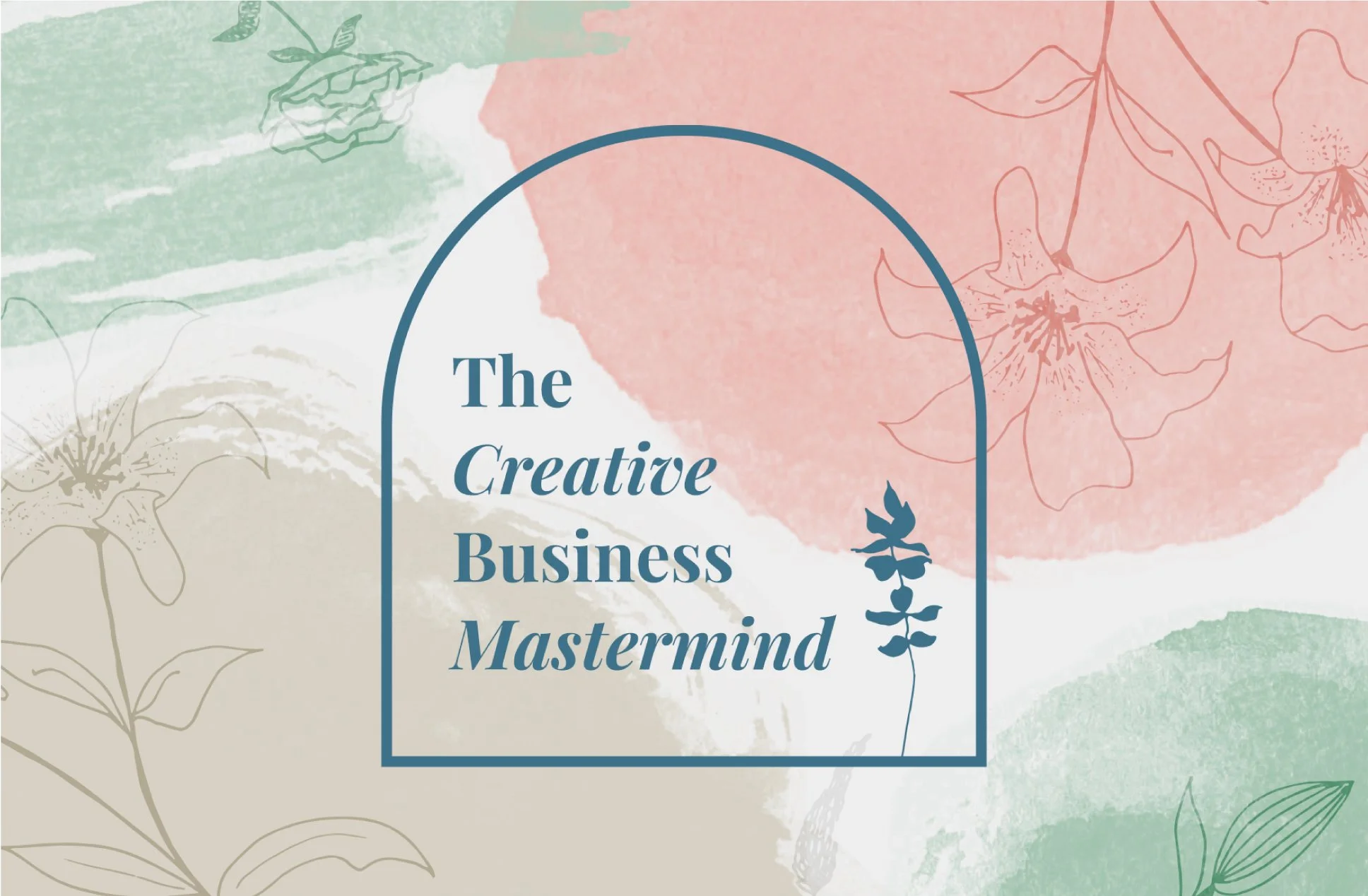From Hobby to business - when & how to make the leap
When I got laid off from my fancy corporate job, I was at a complete loss. I tried to get another J.O.B., but I would always come up short in the final round and they’d hire someone else. After months of rejection, my husband finally suggested something that changed everything: "Why don't you take some time to play with those art supplies you've gathered over the years?"
Those supplies had been gathering dust in our basement for who knows how long. But suddenly, I had something I'd never had before: nearly unlimited amounts of time. Time to explore, time to experiment, time to rediscover parts of myself that had been buried under years of corporate schedules and other people's priorities.
Since I didn't go to art school and lacked confidence in my drawing skills, I decided to take my first-ever online art class. I found Carla Sonheim, who offers a variety of courses, and she had the perfect one for me: a year-long class called "Y is for Yellow."
Here's how it worked: every two weeks, she'd email us a video lesson to watch. She covered art school basics like "drawing with the wrong hand," "drawing with your eyes closed," and "drawing without letting your pen leave the paper." It was playful, it was liberating, and it was absolutely a blast.
But more importantly, I had two huge "aha" moments that would completely reshape my understanding of what was possible.
The first was realizing that we can all draw. We just need to practice and have a mentor to help us stay on track. The second was discovering that online courses are a big business. A really big business.
That second realization was my turning point – the moment I realized I wanted to get serious about understanding how an online creative business might work for me.
The Moment Everything Shifts
There's a moment in every creative journey when you stop seeing your work as "just a hobby" and start seeing it as something with potential. Maybe it happens when someone offers to buy one of your pieces. Maybe it's when you realize you've been creating consistently for months without forcing yourself. Maybe it's when you start imagining what it would feel like to wake up every morning excited about the work you get to do.
For me, it was recognizing that other people were building entire businesses around teaching creativity – and that maybe, just maybe, I could do something similar.
But here's what I've learned from working with thousands of creative entrepreneurs over the years: that moment of recognition is just the beginning. The real journey starts when you decide whether you're going to act on that recognition or let it remain a pleasant daydream.
As we approach the end of 2025 and start thinking about what we want 2026 to look like, this might be the perfect time to honestly evaluate where you are in your creative journey and where you want to go.
Are you someone who creates for the pure joy of it, with no desire to monetize your work? That's beautiful, and there's absolutely nothing wrong with keeping creativity as your personal sanctuary.
Or are you someone who's been creating consistently, maybe selling a piece here and there, wondering if there might be something bigger possible? Someone who's been watching other creative entrepreneurs and thinking, "I wonder if I could do that too?”
The Fear That Stops Most People
The biggest fears I hear from creative people considering the leap from hobby to business are often about money and marketing and technical skills. I also hear a deeper worry: "What if turning my creativity into a business takes all the joy out of it?"
This fear is completely understandable. We've all heard stories about people who loved baking until they opened a bakery, or loved photography until they started shooting weddings every weekend. The concern is real: what if the business aspects – the bookkeeping, the customer service, the deadlines, the pressure to produce – turn your creative sanctuary into just another source of stress?
Here's what I want you to know: this fear, while valid, is often based on a false premise. The premise that there's only one way to build a creative business, and that way inevitably involves sacrificing the joy of creating.
But what if I told you that building a business around your creativity could actually enhance your joy in creating? What if having a sustainable income from your art gave you the freedom to experiment more, to invest in better supplies, to take workshops that stretch your skills? What if knowing that your creativity was valued enough for people to pay for it actually increased your confidence and enthusiasm?
The key is building your business in a way that aligns with your values and protects what you love most about creating. This isn't about forcing your creativity into someone else's business model. It's about designing a business model that serves your creativity.
Testing the Waters: Your Holiday Opportunity
One of the best ways to explore the leap from hobby to business is to start with small experiments. And right now, as we head into the holiday season, you have a perfect opportunity to test the waters.
The holidays offer a natural testing ground for creative businesses. People are actively looking for unique, handmade gifts. They want to support small businesses and independent artists. They have budgets allocated for special purchases, and they're willing to pay more for something that feels personal and meaningful.
This creates an ideal environment for you to experiment with selling your work without making huge commitments or investments. You could:
Set up a small booth at a local holiday market and see how people respond to your work. Create a limited collection of holiday-themed pieces and offer them to friends and family. List a few items on Etsy or another online platform and see what happens. Partner with a local shop for a small consignment arrangement. I did all of these when I was just getting started.
The goal isn't to make a fortune or prove that you're ready to quit your day job. The goal is to gather information. How does it feel to price your work? What's it like to interact with customers? Do you enjoy the process of presenting and selling your creations, or does it feel draining?
These small experiments provide invaluable insights into whether the business side of creativity energizes you or exhausts you. And they can help you identify which aspects of running a creative business you'd enjoy and which ones you'd want to outsource or minimize.
The Mindset Shifts That Make All the Difference
Making the leap from hobby to business isn't primarily about learning new skills (though you will). It's about shifting how you think about your creativity and your relationship to it.
Shift #1: From "I'm Just Playing Around" to "I'm Developing My Craft"
When you start treating your creative time as skill development rather than just relaxation, everything changes. You become more intentional about what you're learning, more willing to push through challenges, and more interested in feedback and growth. This doesn't mean creativity stops being fun – it means it becomes purposeful fun.
Shift #2: From "I Could Never Charge for This" to "My Time and Skill Have Value"
This is often the hardest shift for creative people to make. We've been conditioned to think that if we enjoy something, it shouldn't be monetized. But your enjoyment doesn't diminish the value of what you create. In fact, the passion you bring to your work often makes it more valuable, not less.
Shift #3: From "I Don't Want to Deal with Business Stuff" to "I Can Learn What I Need to Know"
The business side of creativity doesn't have to be overwhelming or soul-crushing. Like any skill, it can be learned gradually and adapted to fit your personality and preferences. You don't have to become someone you're not – you just have to become willing to grow.
Shift #4: From "Someday Maybe" to "What If I Started Small Today?"
The leap from hobby to business doesn't have to be a dramatic jump. It can be a series of small steps that gradually build confidence and competence. The question isn't whether you're ready for everything. The question is whether you're ready for the next small step.
Protecting the Joy While Building the Business
Here's the truth I've learned from building my own creative business and watching hundreds of others do the same: it is absolutely possible to monetize your creativity without losing the joy in it. But it requires intentionality.
You have to be clear about what aspects of creating bring you the most satisfaction and make sure those remain central to your business model. If you love the meditative process of hand-lettering, don't build a business that requires you to rush through pieces to meet deadlines. If you love experimenting with new techniques, make sure your business allows time and space for that exploration.
You also have to be willing to set boundaries. Just because you're running a business doesn't mean you have to say yes to every opportunity or customer request. Part of protecting your creative joy is being selective about the work you take on and the way you structure your business operations.
Most importantly, you have to remember that your business can evolve. The way you start doesn't have to be the way you continue forever. You can adjust, pivot, and refine your approach as you learn more about what works for you and what doesn't.
The Questions That Guide Your Decision
If you're considering making the leap from hobby to business, here are the questions that can help guide your decision:
Do you find yourself creating consistently, even when you don't have external motivation? Do you enjoy sharing your work with others and seeing their reactions? Are you curious about the business side of creativity, or does it feel completely overwhelming? Do you have ideas for how you might monetize your work, or does that feel impossible to imagine?
When you think about spending more time on your creative work, does that energize you or stress you out? Are you willing to invest time in learning new skills beyond your creative practice? Do you have the support (emotional and practical) to experiment with building a business?
These aren't yes-or-no questions with right or wrong answers. They're reflection questions designed to help you understand your own motivations, fears, and readiness.
What 2026 Could Look Like
As we approach a new year, I want you to imagine two different versions of 2026.
In the first version, you continue creating as a hobby. You make beautiful things for yourself and maybe as gifts for friends and family. You enjoy the process, and creativity remains a personal sanctuary that recharges you after your regular work days.
In the second version, you've taken steps to explore creativity as a business. Maybe you've started selling your work regularly. Maybe you've begun teaching others. Maybe you've discovered that there are people out there who genuinely value what you create and are willing to pay for it. Maybe you've found that the business side of creativity, rather than diminishing your joy, has actually expanded your possibilities.
Both versions are valid. The question is: which one calls to you more strongly?
If the second version creates a flutter of excitement mixed with nervousness, that might be your intuition telling you it's time to explore what's possible.
Taking the First Step
The leap from hobby to business doesn't require you to have all the answers or even know exactly where you're heading. It just requires you to be willing to take the first small step and see what you learn.
Maybe that step is setting up a simple website to showcase your work. Maybe it's applying to participate in a local craft fair. Maybe it's joining an online community of creative entrepreneurs. Maybe it's simply starting to keep track of the time you spend creating and beginning to value that time as an investment in your future.
The beautiful thing about creative businesses is that they can be built gradually, in ways that fit around your current life and responsibilities. You don't have to quit your day job or stop spending time with your grandchildren or make any dramatic changes all at once. You can experiment, learn, adjust, and grow at a pace that feels sustainable for you.
What matters most is that you start from a place of curiosity rather than fear. Instead of asking, "What if I fail?" try asking, "What might I discover about myself and my capabilities?"
Instead of thinking, "I could never do that," try thinking, "I wonder what it would take to learn how to do that."
Instead of waiting until you feel completely ready, try taking one small action while you're still figuring things out.
The Invitation
Your creativity has brought you joy, satisfaction, and a sense of purpose. It has been a source of comfort during difficult times and celebration during good times. It has connected you to parts of yourself that might otherwise remain hidden.
What if that same creativity could also provide some additional income, professional fulfillment, and the opportunity to make a meaningful impact on others?
What if the leap from hobby to business isn't about abandoning what you love, but about amplifying it?
What if 2026 could be the year you discover that your creative gifts are not just personal treasures, but offerings that the world needs and values?
The only way to find out is to begin.
If you're ready to explore what might be possible when you combine your creativity with strategic business thinking, I'd love to support your journey. My Creative Business Mastermind is designed specifically for creative entrepreneurs who are ready to build sustainable, profitable businesses without losing the joy in their creative practice.
This selective program brings together committed artists, makers, and creative service providers who are serious about scaling their creative work in ways that align with their values and protect what they love most about creating.
If you're ready to move beyond wondering "what if" and start discovering "what's possible," I invite you to apply. Together, we can design a business model that serves your creativity rather than the other way around.
It's never too late to create. And it's never too late to create a business that lets you share your gifts with the world while building the life you truly want.
The leap is waiting. The question is: are you ready to jump?
Apply for Creative Business Mastermind and take the first step toward turning your creative passion into a small and manageable creative business.
xo,
Anne
It’s Never Too Late to Create®
If you enjoyed this blog please share it with your friends, family and creative colleagues. Check out my favorite resources by clicking the red button below.
More Resources for You!
Join me on Thursday, October 30 at 8pm ET. Click HERE for details.
The Creative Business Spark Podcast.
Subscribe to the show on Apple Podcasts, Spotify and wherever you get your podcasts.
The Creative Business Mastermind is my highest level program. It gives you behind the scenes access to how I’ve built my creative business. Click HERE to apply. Spots are limited.
Click HERE for details.
MEET ANNE
Hi…I’m Anne!
My creative inspiration comes from a lifetime of observation. I grew up in Paris on the Place St. Sulpice and walked to school through the Luxembourg gardens. And that was only the beginning… Learn more by watching the video on my About page.





